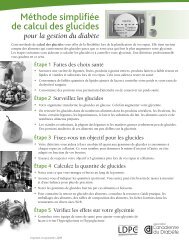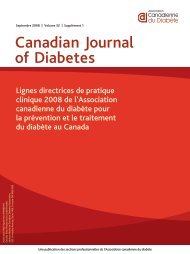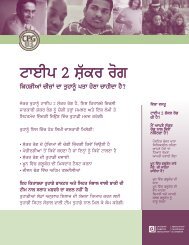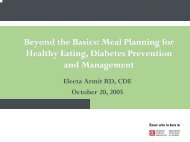2008 Clinical Practice Guidelines - Canadian Diabetes Association
2008 Clinical Practice Guidelines - Canadian Diabetes Association
2008 Clinical Practice Guidelines - Canadian Diabetes Association
You also want an ePaper? Increase the reach of your titles
YUMPU automatically turns print PDFs into web optimized ePapers that Google loves.
<strong>2008</strong> CLINICAL PRACTICE GUIDELINES<br />
S86<br />
Influenza and Pneumococcal Immunization<br />
<strong>Canadian</strong> <strong>Diabetes</strong> <strong>Association</strong> <strong>Clinical</strong> <strong>Practice</strong> <strong>Guidelines</strong> Expert Committee<br />
The initial draft of this chapter was prepared by Vincent Woo MD FRCPC<br />
KEY MESSAGES<br />
• Studies in high-risk individuals, which included people<br />
with diabetes, have shown that influenza vaccination<br />
can reduce hospitalizations by approximately 40%.<br />
• As people with diabetes are at least as susceptible to<br />
pneumococcal infection as other people with chronic diseases,<br />
the use of the pneumococcal vaccine is encouraged.<br />
• A one-time pheumococcal revaccination is recommended<br />
for individuals >65 years of age if the original vaccine<br />
was administered when they were 5 years earlier.<br />
INTRODUCTION<br />
People with diabetes, especially those with renal and cardiac<br />
complications, are at high risk for morbidity and mortality<br />
from influenza and pneumococcal disease (1). Studies in<br />
high-risk individuals, which included people with diabetes,<br />
have shown that influenza vaccination can reduce hospitalizations<br />
by about 40% (2). However, there are few randomized<br />
controlled trials that have specifically evaluated the use and<br />
benefit of influenza or pneumococcal immunization in people<br />
with diabetes (1). <strong>Clinical</strong> practice recommendations for<br />
people with diabetes must therefore be extrapolated from<br />
recommendations for individuals at high risk of complications<br />
associated with these infectious diseases (3-5).<br />
INFLUENZA IMMUNIZATION IN ADULTS<br />
The majority of studies on influenza immunization rely on<br />
observational reports of increased death rates in people with<br />
diabetes during influenza epidemics (6-9). One case-control<br />
study of people with diabetes showed a 6-fold increased risk<br />
of hospitalization during influenza outbreaks compared to<br />
nonepidemic years (9).<br />
A retrospective case-control study demonstrated the<br />
effectiveness of influenza vaccination in reducing rates of<br />
hospitalization of people with diabetes for influenza, pneumonia<br />
or diabetes-related events during 2 influenza epidemics<br />
in Leicestershire, England, United Kingdom (10).<br />
The study detected a 79% reduction in hospitalization rates<br />
during the 2 epidemics in people with diabetes who had been<br />
immunized against influenza during the period immediately<br />
preceding the epidemic. Another nested case-control study<br />
in the Netherlands demonstrated that vaccination was associ-<br />
ated with a 56% reduction in any complication, a 54% reduction<br />
in hospitalizations and a 58% reduction in deaths in<br />
people with type 2 diabetes (11).<br />
PNEUMOCOCCAL IMMUNIZATION<br />
IN ADULTS<br />
Numerous studies have demonstrated the efficacy of immunization<br />
in reducing pneumococcal bacteremia in the general<br />
population (12-15).There is widespread acceptance that people<br />
with diabetes are at least as susceptible to pneumococcal<br />
infection as other people with chronic diseases (1), and therefore<br />
the use of the pneumococcal vaccine is encouraged in this<br />
population. A one-time revaccination is recommended for<br />
individuals >65 years of age if the original vaccine was administered<br />
when they were 5 years earlier.<br />
RECOMMENDATIONS<br />
1. People with diabetes should receive an annual influenza<br />
vaccine to reduce the risk of complications associated<br />
with influenza epidemics [Grade D, Consensus].<br />
2. People with diabetes should be considered for vaccination<br />
against pneumococcus [Grade D, Consensus].<br />
RELATED WEBSITES<br />
National Advisory Committee on Immunization. <strong>Canadian</strong><br />
Immunization Guide. 7th ed. Ottawa, ON: <strong>Canadian</strong> Medical<br />
<strong>Association</strong>; 2006. Available at: http://www.phac-aspc.gc.<br />
ca/publicat/cig-gci/index.html.Accessed September 1, <strong>2008</strong>.<br />
REFERENCES<br />
1. Smith SA, Poland GA. Use of influenza and pneumococcal vaccines<br />
in people with diabetes. <strong>Diabetes</strong> Care. 2000;23:95-108.<br />
2. Nichol KL, Nordin J, Mullooly J, et al. Influenza vaccination<br />
and reduction in hospitalizations for cardiac disease and stroke<br />
among the elderly. N Engl J Med. 2003;348:1322-1332.<br />
3. Casey JI. Host defense abnormalities in diabetic patients. In:<br />
Rifkin H, Raskin P, eds. <strong>Diabetes</strong> Mellitus. Vol 5. Bowie, MD:<br />
Robert J. Brady Company; 1981:219-223.<br />
4. Heymann AD, Shapiro Y, Chodick G, et al. Reduced hospitalizations<br />
and death associated with influenza vaccination among<br />
patients with and without diabetes. <strong>Diabetes</strong> Care. 2004;27:<br />
2581-2584.











